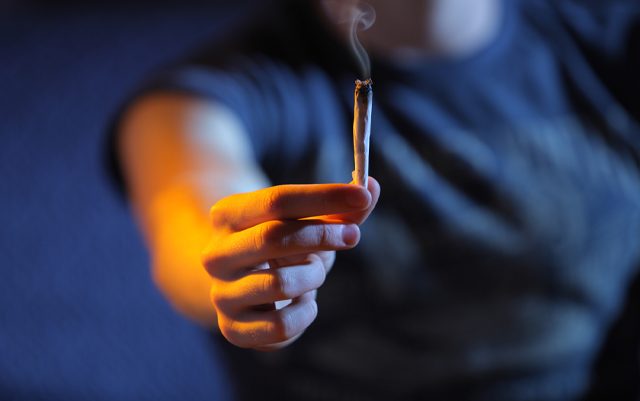Last month, the Coalition to Regulate Marijuana Like Alcohol in Michigan turned in some 365,000 signatures in an attempt to get on the November 2018 statewide ballot. If successful, the measure would legalize cannabis possession, growing and purchasing by those 21 years of age and older.
As you can imagine, there is opposition to this plan. As you can also imagine, the opposition is having a hard time articulating exactly why the system of black market sales is better than a system of legal, regulated sales.
Scott Greenlee, the president of Healthy and Productive Michigan, was recently on a Michigan radio program and was asked about why his group opposes legalization. He made quite a few weak points, while also not ruling out taking money for his group from opioid manufacturers, but I’m going to focus on two major holes in his theory.
“A lot of people have talked about the tax dollars it will generate,” Greenlee said. “As folks have found out in Colorado, the tax dollars come along with a cost and, interestingly enough, in a lot of cases, tax dollar projections and revenue projections don’t come quite in where they should be.”
While projections and actuality will always have discrepancies – that’s why they are called projections, after all – the fact is that as of this summer, Colorado had collected over $500 million in tax revenue since recreational sales began in January of 2014. This brings us to the “cost” involved in legalization. It’s something Greenlee references later in the interview and something the interviewer tries to get a better answer on.
“…there’s going to be a significant discussion with regard to how legalized recreational marijuana is managed in our state,” Greenlee said. “There will be costs that inherently come along with that, rather it’s law enforcement-type costs, rather it’s actual increased research costs, rather it’s medical costs.”
Of course, in actuality, law enforcement costs decrease under legalization as police focus on other things, and studies have shown Medicare costs are dropping in states with robust medical marijuana programs. As for “research costs,” is he saying we shouldn’t study marijuana’s effects on people?
“Well Colorado’s had a lot of issues, you know,” Greenlee continued. “They just had their fifth year of legalized recreational marijuana, and most of what they had hoped would be the case is not the case.” Like what? He goes on to reference some businesses having to deal with drug testing employees and makes oblique reference – I think – to increased cases of marijuana ingestion in Colorado emergency rooms, an issue I’ve talked about and Politico covered quite fairly. In any case, I fail to see how those things mean prohibition and the black market is superior to legalization, which is what Greenlee is arguing for.







Yeah–a little respect for history, please. No one should promote the canard that marijuana is dangerous–inherently toxic–like pharmaceutical drugs. Marijuana is not a ‘drug’, unless we lean heavily on Merriam-Webster’s third and broadest definition, as something that affects the mind. By that definition, religion and television (‘the plug-in drug’) should also be included. In truth marijuana is a medicinal herb, cultivated, bred, and evolved in service to human beings over thousands of years.
“The Nixon campaign in 1968, and the Nixon White House after that had two enemies: the anti-war left and black people. We knew we couldn’t make it illegal to be either against the war or black, but by getting people to associate the hippies with marijuana and blacks with heroin, and then criminalizing both heavily, we could disrupt those communities. We could arrest their leaders, break up their homes, break up their meetings, and vilify them night after night on the evening news. Did we know we were lying about the drugs? Of course we did.” –John Ehrlichman
Activists have since found that some alcoholics are using marijuana to escape their addictions to The Demon Rum. Here prohibition of cannabis has been built on a tissue of lies: Concern For Public Safety. Our new laws save hundreds of lives every year, on our highways alone. In November of 2011, a study at the University of Colorado found that in the thirteen states that decriminalized marijuana between 1990 and 2009, traffic fatalities dropped by nearly nine percent—now nearly ten percent in Michigan—more than the national average, while sales of beer went flat by five percent. No wonder Big Alcohol opposes it. Ambitious, unprincipled, profit-driven undertakers might be tempted too.
In 2012 a study released by 4AutoinsuranceQuote revealed that marijuana users are safer drivers than non-marijuana users, as “the only significant effect that marijuana has on operating a motor vehicle is slower driving”, which “is arguably a positive thing”.
No one has ever died from an overdose of marijuana. It’s the most benign ‘substance’ in history. Most people—and particularly patients who medicate with marijuana–use it in place of prescription drugs or alcohol.
Marijuana has many benefits, most of which are under-reported or never mentioned in American newspapers. Research at the University of Saskatchewan indicates that, unlike alcohol, cocaine, heroin, or Nancy (“Just say, ‘No!’”) Reagan’s beloved nicotine, marijuana is a neuroprotectant that actually encourages brain-cell growth. Researchers in Spain (the Guzman study) and other countries have discovered that it also has tumor-shrinking, anti-carcinogenic properties. These were confirmed by the 30-year Tashkin population study at UCLA.
Drugs are man-made, cooked up in labs, for the sake of patents and the profits gained by them. Often useful, but typically burdened with cautionary notes and lists of side effects as long as one’s arm. ‘The works of Man are flawed.’
Marijuana is a medicinal herb, the most benign and versatile in history. In 1936 Sula Benet, a Polish anthropologist, traced the history of the word “marijuana”. It was “cannabis” in Latin, and “kanah bosm” in the old Greek and Hebrew scrolls, quite literally the Biblical Tree of Life, used by early Christians to treat everything from skin diseases to deep pain and despair. Why despair? Consider the current medical term for cannabis sativa: a “mood elevator”. . . as opposed to antidepressants, which ‘flatten out’ emotions, leaving patients numb to both depression and joy.
The very name, “Christ” translates as “the anointed one”. Well then, anointed with what? It’s a fair question. And it wasn’t holy water, friends. Holy water came into wide use in the Middle Ages. In Biblical times, it was used by a few tribes of Greek pagans. And Christ was neither Greek nor pagan.
Medicinal oil, for the Prince of Peace. A formula from the Biblical era has been rediscovered. It specifies a strong dose of oil from kanah bosom, ‘the fragrant cane’ of a dozen uses: ink, paper, rope, nutrition. . . . It was clothing on their backs and incense in their temples. And a ‘skinful’ of medicinal oil could certainly calm one’s nerves, imparting a sense of benevolence and connection with all living things. No wonder that the ‘anointed one’ could gain a spark, an insight, a sense of the divine, and the confidence to convey those feelings to friends and neighbors.
Don’t want it in your neighborhood? Maybe you’re not the Christian you thought you were.
Me? I’m appalled at the number of ‘Christian’ politicians, prosecutors, and police who pose on church steps or kneeling in prayer on their campaign trails, but cannot or will not face the scientific or the historical truths about cannabis, Medicinal Herb Number One, safe and effective for thousands of years, and celebrated as sacraments by most of the world’s major religions.